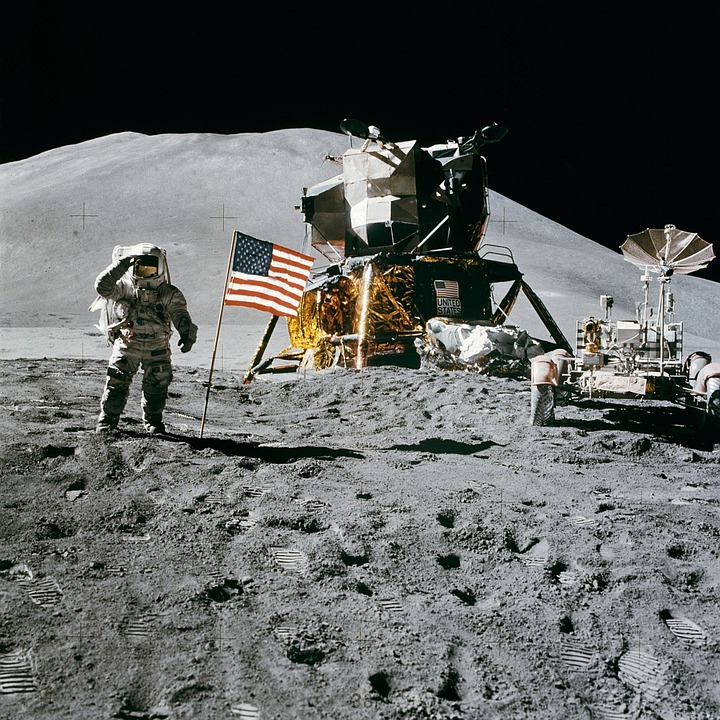NASA has had hits and misses when it comes to moon missions since its first mission back in 1969. Astronaut Al Worden shared his experience during the Apollo 15 mission, including the moment that threatened the entire mission.
Worden, along with fellow astronauts James Scott and David Irvin, were the three men assigned to Apollo 15, which is NASA’s fourth attempt at making a moon landing. Back in 2011, Worden shared his stories on Apollo 15. Worden shared that one day during the mission, they had some tomato soup, and the bag burst open a little too quickly for them to do anything, thus disturbing the surface tension of the soup in the bag. “The whole portion of the soup came out of the bag and it was a ball this big around,” shared the astronaut.
He went on to say that the floating ball of tomato soup floating around was the most serious moment between the three astronauts up in space. He explained that it was because if in the event that the ball of soup went into an instrument panel, the surface tension would break even further and the ball of tomato soup will multiply, turning into smaller balls of soup and will result in the short-circuiting of the machines and instruments within the spaceship.
Fortunately, the three astronauts were able to contain the soup before the bigger problem would arise. Worden added that they could not touch the ball of soup with a spoon due to it breaking into a thousand balls of soup if it makes contact. As to how they managed to contain the soup, Worden shared that they used a towel, wrapped it around the ball of soup and let it get absorbed by the towel.
Meanwhile, it was previously reported that experts are warning NASA to treat Mars in the same manner as how they treat the Moon, due to the risk of wiping out the “second genesis of life.” This is in light of the space agency’s plan to lower planetary protection on the Red Planet.
Instead, the experts suggest that NASA re-label large parts of Mars as Category II, which is what the Moon is classified under. Category II would mean that there is a low chance of transferring terrestrial organisms to certain niches.



 FDA Adds Fatal Risk Warning to J&J and Legend Biotech’s Carvykti Cancer Therapy
FDA Adds Fatal Risk Warning to J&J and Legend Biotech’s Carvykti Cancer Therapy  Eli Lilly’s Inluriyo Gains FDA Approval for Advanced Breast Cancer Treatment
Eli Lilly’s Inluriyo Gains FDA Approval for Advanced Breast Cancer Treatment  Blue Origin’s New Glenn Achieves Breakthrough Success With First NASA Mission
Blue Origin’s New Glenn Achieves Breakthrough Success With First NASA Mission  NASA and Roscosmos Chiefs Meet in Florida to Discuss Moon and ISS Cooperation
NASA and Roscosmos Chiefs Meet in Florida to Discuss Moon and ISS Cooperation  NASA Astronauts Wilmore and Williams Recover After Boeing Starliner Delay
NASA Astronauts Wilmore and Williams Recover After Boeing Starliner Delay  SpaceX’s Starship Completes 11th Test Flight, Paving Way for Moon and Mars Missions
SpaceX’s Starship Completes 11th Test Flight, Paving Way for Moon and Mars Missions  CDC Vaccine Review Sparks Controversy Over Thimerosal Study Citation
CDC Vaccine Review Sparks Controversy Over Thimerosal Study Citation  Tabletop particle accelerator could transform medicine and materials science
Tabletop particle accelerator could transform medicine and materials science  Lost in space: MethaneSat failed just as NZ was to take over mission control – here’s what we need to know now
Lost in space: MethaneSat failed just as NZ was to take over mission control – here’s what we need to know now  Trump Administration to Launch Autism Initiatives Targeting Acetaminophen Use and New Treatment Options
Trump Administration to Launch Autism Initiatives Targeting Acetaminophen Use and New Treatment Options  Trump Signs Executive Order to Boost AI Research in Childhood Cancer
Trump Signs Executive Order to Boost AI Research in Childhood Cancer  Is space worth the cost? Accounting experts say its value can’t be found in spreadsheets
Is space worth the cost? Accounting experts say its value can’t be found in spreadsheets 































